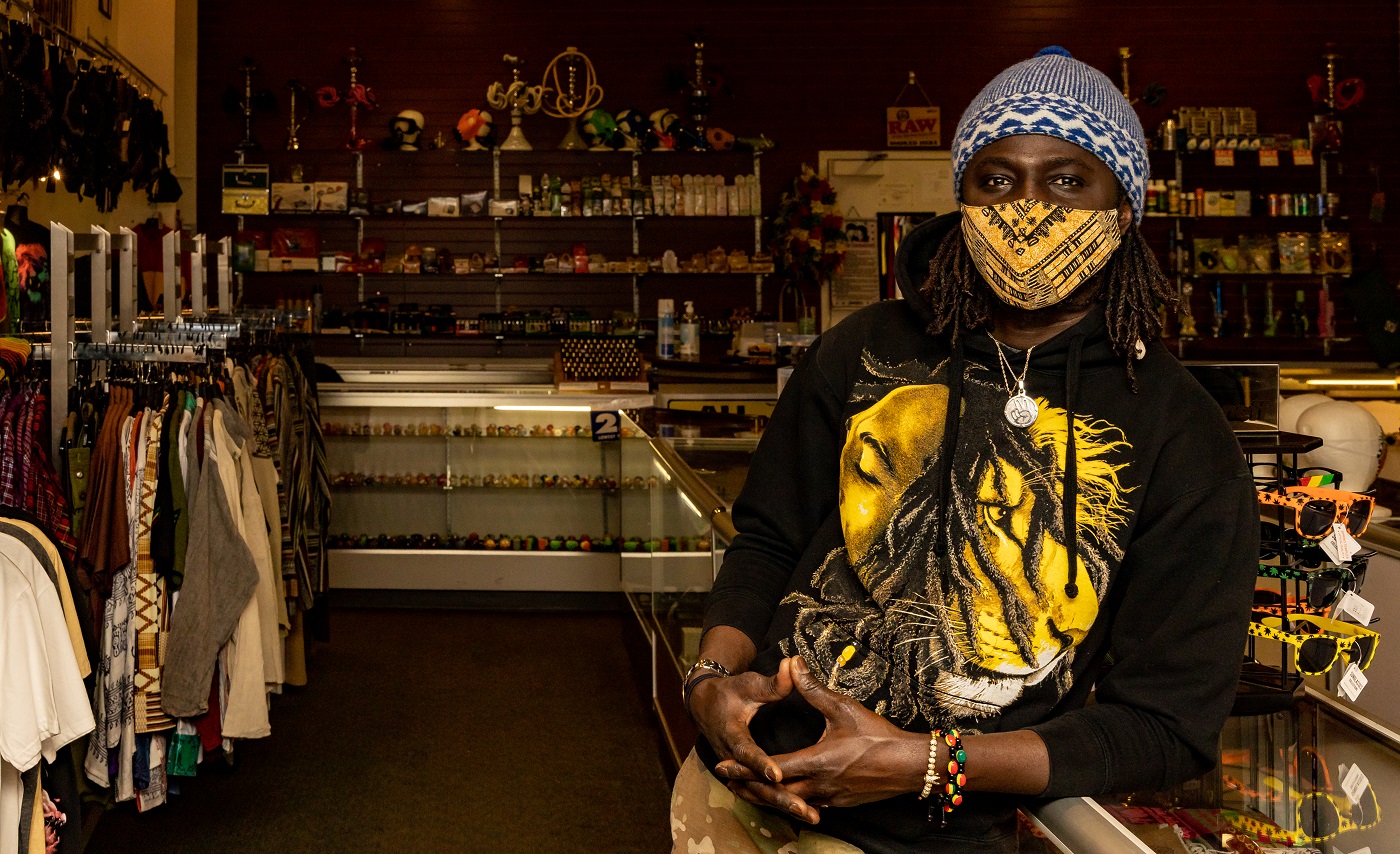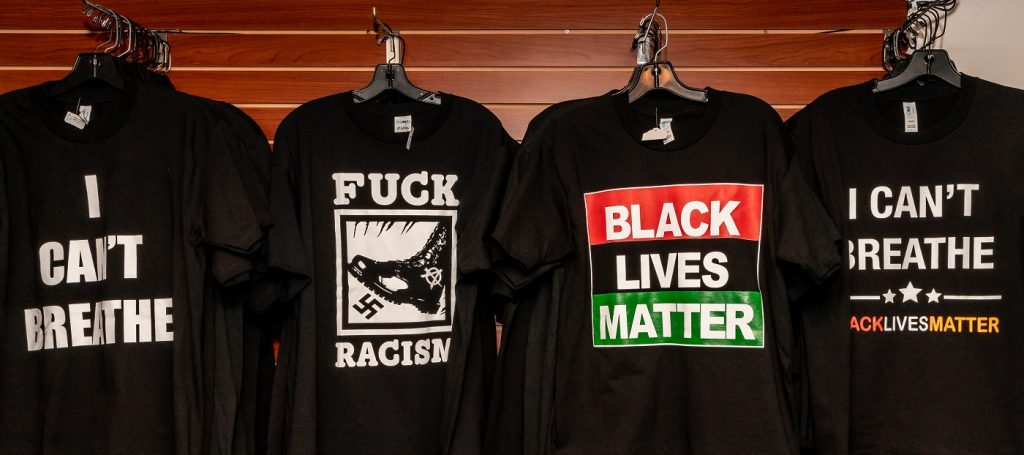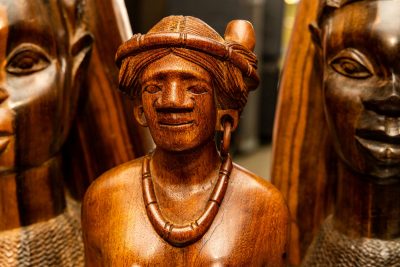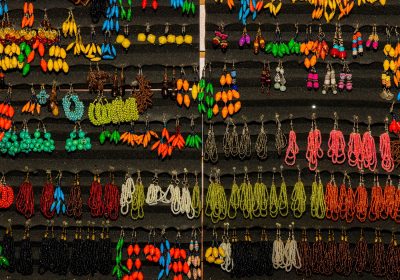
Twisted Roots: Bringing Afro-Caribbean Style and Community to Downtown SLC
Shop Local
For Ibou Fall, Owner of Twisted Roots on Main Street in Downtown Salt Lake, owning a brick-and-mortar store is more than just selling merchandise and items: It’s about supporting a community.
Stepping into Twisted Roots, the bright colors of the Senegal flag—red, yellow and green—immediately greet you, hanging on the walls and appearing on merchandise, from backpacks to shirts to hookahs and tobacco products. The sweet smell of incense wafts slowly from the counter, and more often than not music blares throughout the store, sometimes turning into full-on dance parties inside or out on the sidewalk. Fall is often posted up behind the counter, beaming at customers as they walk in to check out his merchandise.
Fall describes Twisted Roots as an “African, bohemian and hippy store,” a description he says is ever-shifting from month to month, based on what might be in stock or what Fall might decide will be on sale at the time. There’s a headshop-meets-surf shop present vibe throughout Twisted Roots: Reggae music plays, Bob Marley’s face grins on merchandise throughout the shop, grinders and pipes are sold behind the counter and an occasional Beatles Abbey Road shirt walks its way into Fall’s inventory.

“Twisted Roots is more than just selling merchandise and items.”
But what stands out in Twisted Roots, and what makes it a unique store in the melting pot of Downtown SLC, is its Afro-Caribbean influence and the way it gives back to Utah’s African and Caribbean community. Fall hails from Senegal. Fleeing poor conditions in his home country, he originally moved to California in 1997 and came to Utah in 2002. “We needed to get out of Senegal; things were not great there,“ Fall says. “We needed a change and the US was a good place for that.”
When Fall and his family arrived in Utah, they loved the affordability and the landscape

with the mountains framing the city on either side. When thinking of what he wanted to do for work, Fall says he noticed there weren’t many Afro-Caribbean stores in Salt Lake City and decided he wanted to change that. “There was no one in Utah selling this kind of merchandise—African-Caribbean merchandise—so we started to pioneer it,” Fall says.
Fall and his family began leasing a location on Main Street, and Twisted Roots was born. Soon after opening, Fall says immigrants from African and Afro-Caribbean countries began to trickle in. “They started to hear about us with word of mouth, trying to find some Afro-Caribbean clothing that reminds them of home,” Fall says. “And we’re the only place that has those things for these people.”
Fall says he also started to notice immigrants needing other help with services, or just finding a community to feel part of. Knowing what it’s like to be in a new town, and to be disconnected from one’s roots, Fall started providing the members of Utah’s immigrant community who visited his store information he found helpful when he first moved to Utah. “I tell them places to eat, African or Caribbean places, places to find housing where immigrants from the same area are,” Fall says. “So they feel like they’re more home, comfortable in a new place. I know it’s hard to come here and get used to a new culture, so I want to help these people get that sense of home a little.”

“I want to help these people get that sense of home a little.”
Now, Twisted Roots stands as a gathering place for a community of Afro-Caribbean immigrants. Fall says the store has transformed over the years from something that offers merchandise to a pillar of the community and a valuable place to find help. He says that he sees his store as a staple in the Downtown area as well, which has been hit hard by the COVID-19 pandemic. “We like it on Main Street, even though at times it’s been hard,” Fall says. “We bring a booth to all the Downtown music festivals and want to help make Main Street strong. There are drawbacks to being Downtown—no one can park easy, people live out in West Valley, West Jordan—but we have lots of regulars here, too. We just hope it comes back soon after the pandemic.”
Like many small business owners across the country and globe, Twisted Roots has suffered and sales have dropped since COVID-19 started sweeping through the nation over a year ago. Fall says he was forced to close and reopen the store in fits and starts, and even though they’re back open, things are still quite slow. “We survive on foot traffic and regulars from offices near here,” he says. “There’s been so few of those, even through Christmas, which is our busy time. Now we’re back to the slow season after not much picking up in December.”
Sticking around and remaining committed to helping his community during these crazy times is the least thing he can do for the city Fall says he’s grown to love and call home. “If people can’t pay full price, or if they need something we have at the store, I want people to know we can work it out for them,” Fall says. “Everyone is struggling [and] no one is immune, so why should we ask someone to pay full price when we know how tough it is? We’re here for Utah. Utah’s here for us.”
You can check out Twisted Roots’ latest inventory and highlights from the store on Instagram @twistedrootsut.
